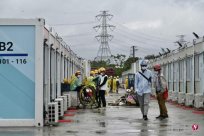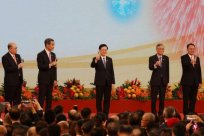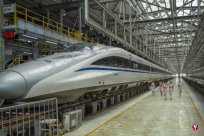Japanese free reporter Kawasumi Kawasuma was rejected in Hong Kong on Thursday (June 29). When he was questioned by the Hong Kong Entry Department, he said that he did not comment on individual cases.
Comprehensive reports of the Japanese Asahi Shimbun News and Voice of America, Ogawa Sasteaki arrived in Hong Kong on Thursday evening, and was brought to a room by the staff of the Immigration Department to get a question on Friday (30th).Rejects to the Immigration Notice "and forced repatriation to Narita Airport in Japan.The staff of Hong Kong's immigration prescriptions did not explain the reason, but only said it was impossible to give a stay permit.
The Hong Kong Entry Department responded on Friday on Friday inquiries that without commenting on individual cases, each case would be dealt with in accordance with relevant laws and policies.
The 54 -year -old Kawasumi Zhao arrived in Hong Kong by a flight from Tokyo to prepare for the three years after interviewing the Hong Kong National Security Law in Hong Kong, but was refused to enter the country.He said, "It feels like a completely different place from the free Hong Kong I know in the past. I hope it can wait until the day when I can go to Hong Kong again."Interviewed the "Occupation Central" campaign, and has been paying attention to the issue of Hong Kong after that.He wrote a column for magazines such as FORBES JAPAN, and recently published his work in Hong Kong, a work of the anti -repair campaign in 2019.
Ye Jinlong, a spokesman for the Hong Kong Democratic Alliance in Japan, pointed out that although reporters from different countries have been rejected by the Hong Kong government before, this is the first case of Japanese journalists being rejected by the Hong Kong government.
After investigation of the information, I found that Japanese photographer Kato Ishiko, who had published a collection of anti -repair campaigns, was refused to enter the country when he went to Hong Kong earlier this year; Japanese music performed on the streets of Hong Kong many times;Man Wally also said on the social platform that he was refused to enter the country last month and was forced to return to Japan.
A spokesman for the Hong Kong Security Bureau responded to the inquiry that Hong Kong law enforcement agencies adopted law enforcement actions in accordance with the law, strictly in accordance with the law, and in accordance with relevant persons or units' actions, which has nothing to do with its political position, background or occupation.
When asked if he received a view from the reporter involved in the case and the Japanese reporter was refused to enter the country, the Japanese Consulate General in Hong Kong stated that he would not comment on Friday and said it was called a Japanese national who went overseas to go abroad safely to go abroad.And staying overseas, the museum will continue to distribute useful information and other methods to provide support for Japanese citizens.




